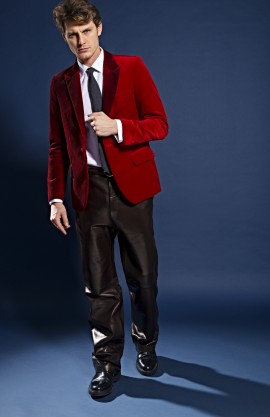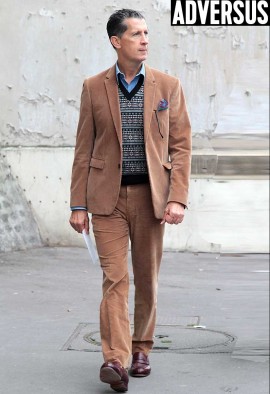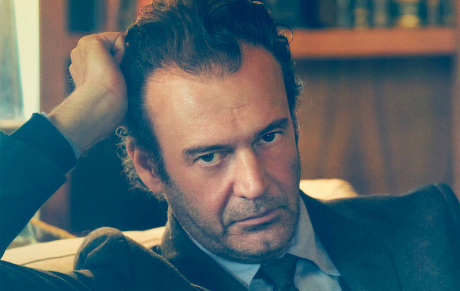V COME VELLUTO
A sinistra, scatto di Federico Miletto per The Men Issue, Styling Giovanni de Ruvo. A destra, Stefano Tonchi in uno scatto di streetstyle (fonte: Adversus)
L’alfabeto della moda oggi chiama in causa la lettera V, per velluto.
Esistono diverse tipologie di velluti, ottenute attraverso varie lavorazioni: da quello dévoré, al velluto a coste, al froissé dall’aspetto sgualcito, fino ai velluti elasticizzati e quelli utilizzati per l’abbigliamento sportivo. Il velluto liscio, però, rispetto agli altri, nella sua semplicità e tatto fluido è da sempre simbolo di classe, riveste e cela ogni cosa, vantando un’innata bellezza, unita a eleganza e mistero.
La sua origine probabilmente risale al XIII secolo circa in Oriente, diventando poi celebre anche in Europa grazie alla lavorazione dei maestri Palermitani e Veneziani. Apprezzato dalle classi nobili, quello che andava per la maggiore era decorato: con disegni gotici, fiori stilizzati, oppure con ricami di alberi, uccelli, in modo da ricordare i velluti orientali. Con il Rinascimento diventa ancor più simbolo di opulenza, sfoggiato nell’abbigliamento e negli arredi delle dimore aristocratiche.
Il velluto accarezza i nostri sensi, una caratteristica che ha acquisito molteplici sfaccettature nel tempo. Usata per definire una voce calda, o il tocco morbido di una rosa, una tenera carezza, fino al potere, al lusso estremo, al mistero e all’erotismo, la parola velluto, infatti, compare in diversi testi di canzoni, o titoli di film e romanzi, assumendo molto spesso significati contrastanti.
Nel gruppo musicale rock new wave dei Velvet Underground, così come nella omonima novella pornografica dove si descrive la sfera sessuale underground americana dei primi anni 70, il velluto prende forma e potenza, adattandosi esattamente ai testi e alla poetica del gruppo musicale.
In Blue Velvet, film del 1986 di David Lynch, questa parola ci fa addentrare in una sfera noir, avvolgente e fatta di perdizione e voyeurismo.
In assoluta contrapposizione, nell’espressione Rivoluzione di Velluto, manifestazione pacifica del 1989, il termine viene utilizzato con un’accezione di delicatezza, una richiesta gentile e non violenta che riesce a rovesciare il regime Comunista Cecoslovacco.
Anche nella moda il velluto, in base ai suoi utilizzi, colori e fattezze cambia di significato: nei toni del rosso o comunque in colori scuri è autorevole, elegante e raffinato, se indossato in toni neutri o pastello diventa piu aggraziato e dolce, nei marroni e toni delle terre ha un sapore vintage e casual.
Nelle collezioni attuali autunno/inverno, così come potete vedere nella gallery che vi proponiamo, i designer rappresentano il velluto in varie forme e colori, da Dries Van Noten con il suo bomber blu con ricami floreali, a Emporio Armani che taglia in due parti esatte la giacca con un effetto patchwork, a Gucci che propone una vestaglia da camera verde acceso con passamanerie ed alamari in perfetto stile orientale.
Nello scatto realizzato da Federico Miletto per The Men Issue, il modello indossa una giacca dal taglio classico in velluto rosso della fall winter 18 di Golden Goose Deluxe Brand, con camicia e cravatta, rendendolo attuale e anticonformista con l’utilizzo di un pantalone in pelle ampio e boots. Nello scatto di street style, invece, vediamo l’Editor in chief di W Magazine, Stefano Tonchi, indossare un total look in velluto liscio con camicia, pochette nel taschino, maglia jacquard e penny loafer nei toni del marrone, tutto dal sapore un po retrò. Giovanni de Ruvo
The fashion alphabet today is about V, for Velvet. There are many varieties of velvet, obtaneid through different processing techniques: from crushed velvet, corduroy, froissé dall’aspetto sgualcito, to stretch and tech velvet (for sportswear). But smooth velvet, with its simplicity and softness, has always been a symbol of style, it covers and hide, boasting an innate beauty, combined with elegance and mistery. Its origins probably come from the Far East in the XIII century, becoming then popular in Europe thanks to the manufacturing of Palermitan and Venetian masters. Appreciated by the aristocracy, the most fashionable one was embellished: with gotic and floral patterns, or with emboideries of trees, birds, in order to recall the oriental fabrics. With the Renaissance it becomes a symbol of opulence, flaunted in clothing and interiors. Velvet caresses our senses, a feature that has acquired many meanings through time. Udes to define a warm voice, the soft touch of a rose, a tender caress, up to power, extreme luxury, mistery and eroticism, the word velvet, indeed, appears in many songs’ lyrics, or in titles of movies and novels. In the rock new wave band of the Velvet Underground, as like as in the namesake pornographic novel that describes the American underground sexual sphere of the early 70s, velvet takes shape and strenght, adapting itself to the lyrics and the poetics of the band. In Blue Velvet, a movie by David Lynch of 1968, this word leads us to a noir, enveloping feel, made of perdition and voyeurism. In total opposition, in the expression “Velvet Revolution”, pacific revolution of 1989, the word is used with a sense of sensitivity, a gentle and non-violent request that was able to overturn the Czechoslovakian Communist regime. Even in fashion velvet, based on use, colors and shapes, changes its meaning: in red or dark shades it’s powerful, elegant and refined, in neutral or pastel shades it becomes delicate, in brown it has a vintage and casual appearance. In the f/w 18/19 collections, as you can see in the gallery above, designers suggest velvet in different shapes and colors, from Dries Van Noten with a blue bomber jacket with floral embroideries, to Emporio Armani that divides a jacket in two parts with a patchwork effect, to Gucci that proposes a bright green nightgown with trimmings and frogs for a perfect oriental style. In the picture by Federico Miletto for The Men Issue, the model wears a classic jacket made of red velvet of the fall/winter Golden Goose Deluxe Brand collection, with shirt and tie, matching it with loose leather trousers and boots, for a modern and eccentric look. In the streetstyle shot instead, we can see the Editor in chief of W Magazine, Stefano Tonchi, wearing a velvet total look with shirt, pocket handkerchief, jacquard jumper and penny loafers in the shades of brown, with a retro taste. Giovanni de Ruvo








